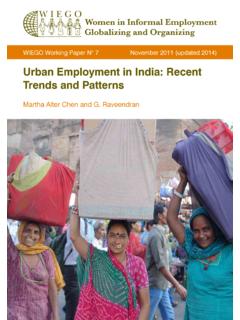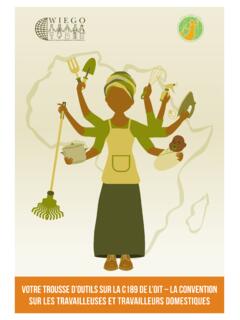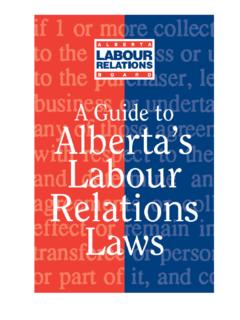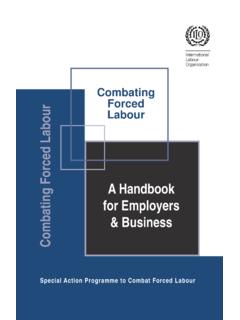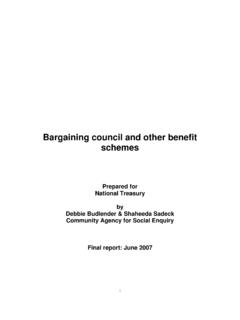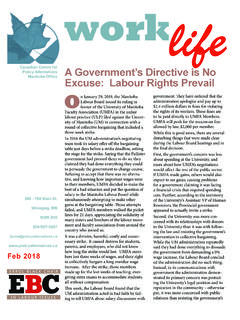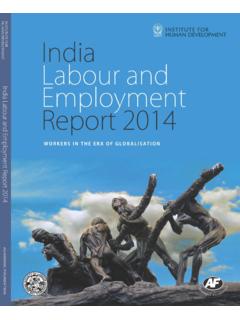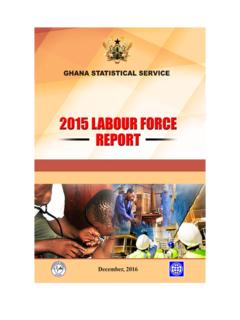Transcription of The Informal Economy: Definitions, Theories and Policies
1 WIEGO Working Paper No 1 August 2012. The Informal Economy: Definitions, Theories and Policies Martha Alter Chen WIEGO Working Papers The global research-policy-action network Women in Informal Employment: Globalizing and Organizing (WIEGO) Working Papers feature research that makes either an empirical or the- oretical contribution to existing knowledge about the Informal economy especially the work- ing poor, their living and work environments and/or their organizations. Particular attention is paid to policy-relevant research including research that examines policy paradigms and practice. This series includes statistical profiles of Informal employment and critical analysis of data collection and classification methods.
2 Methodological issues and innovations, as well as suggestions for future research, are considered. All WIEGO Working Papers are peer re- viewed by the WIEGO Research Team and/or external experts. The WIEGO Publication Series is coordinated by the WIEGO Research Team. About the Author: Martha Alter Chen is a Lecturer in Public Policy at the Harvard Kennedy School and International Coordinator of WIEGO. An experienced development practitioner and scholar, her areas of specialization are employment, gender, and poverty. Before joining Harvard in 1987, she worked in Bangladesh with BRAC (now the world's largest NGO), and in India as a field representative of Oxfam America for India and Bangladesh.
3 Dr. Chen received a PhD in South Asia Regional Studies from the University of Pennsylvania. Publication date: August 2012. ISBN number: ISBN 978-92-95095-41-0. Published by Women in Informal Employment: Globalizing and Organizing (WIEGO). A Charitable Company Limited by Guarantee Company No. 6273538, Registered Charity No. 1143510. WIEGO Secretariat WIEGO Limited Harvard Kennedy School, 521 Royal Exchange 79 John F. Kennedy Street Manchester, M2 7EN, Cambridge, MA 02138, USA United Kingdom Copyright WIEGO. This report can be replicated for educational and organizing purposes as long as the source is acknowledged. Cover photograph by: Martha Alter Chen WIEGO Working Paper No 1.
4 Contents I. Historical II. Recent Expanded Statistical Holistic Conceptual III. Links with Formal Firms & Formal Linkages with Formal Linkages with the Formal Regulatory IV. The Formalization V. Comprehensive Policy Goal #1 Create More Jobs, Preferably Formal Goal #2 Register Informal Enterprises & Regulate Informal Goal #3 Extend State Protection to the Informal Workforce ..17. Goal #4 Increase Productivity of Informal Enterprises & Incomes of the Informal VI. The Future of WIEGO Working Paper No 1. Abstract Today, there is renewed interest in the Informal economy worldwide. This is because a large share of the global workforce and economy is Informal and because the Informal economy is growing in many contexts and appearing in new places and guises.
5 This working paper, the first in the WIEGO series, provides an overview of the definitional, theoretical, and policy debates on the Informal economy. The paper opens with a brief historical overview of the Informal sector concept and related debates, focusing on the four domi- nant schools of thought about the Informal economy. It then turns to recent rethinking of the concept, de- tailing the expanded statistical concept of Informal employment and holistic conceptual models of the com- position and causes of informality. The paper also examines the linkages between the Informal economy, formal firms, and formal regulations and the formalize the Informal economy debate.
6 The paper proposes a comprehensive policy response to the Informal economy with four main pillars: create more formal jobs;. regulate Informal enterprises and Informal jobs; extend state protections social and legal to the Informal workforce; and increase the productivity of Informal enterprises and the incomes of Informal workers. The paper concludes with a call for a fundamental rethinking of the future of the Informal economy. 1. WIEGO Working Paper No 1. Introduction It was widely assumed during the 1950s and 1960s that, with the right mix of economic Policies and resources, low-income traditional economies could be transformed into dynamic modern economies.
7 In the process, the traditional sector comprised of petty trade, small-scale production, and a range of casual jobs would be absorbed into the modern capitalist or formal economy and, thereby, disappear. This perspec- tive was reflected in the prediction by W. Arthur Lewis, in the 1954 essay for which he received a Nobel Prize in Economics, that economic development in developing countries would, in the long-term, generate enough modern jobs to absorb surplus labour from the traditional economy. This would lead to a turning point when wages would begin to rise above the subsistence level: what is referred to even today as the Lewis Turning Point (Lewis 1954). This perspective was reinforced by the successful rebuilding of Europe and Japan after World War II and the expansion of mass production in Europe and North America during the 1950s and 1960s.
8 By the mid- 1960s, however, the optimism about the prospects for economic growth in developing countries began to give way to concerns about persistent widespread unemployment. This led development economist Hans Singer to argue in 1970 that he saw no sign of the Lewis Turning Point in developing countries. In sharp contrast with the historical experience in developed countries, unemployment and under-employment of various kinds were on the rise in developing countries, even those that were growing economically. Singer attributed this trend to an imbalance resulting from technological advances: an imbalance between lim- ited creation of jobs due to the extensive use of capital-intensive technology and significant growth in the population and labour force due to technological progress in health and disease control.
9 He predicted a persistent dangerous dualism in labour markets with high levels of casual and intermittent employment, as well as disguised or open unemployment. He also warned of an employment crisis due to acute land shortage in overcrowded farming communities and an acute job shortage in overcrowded urban communi- ties (Singer 1970). Reflecting this concern, the International Labour Office Organization mounted a series of large multi-disci- plinary employment missions to various developing countries. Hans Singer and Richard Jolly were asked to lead the first employment mission to Kenya in 1972. The Kenya Mission found that the traditional sector in Kenya, which they called the Informal sector, included profitable and efficient enterprises as well as marginal activities (ILO 1972).
10 The term Informal sector had been coined the year before by a British an- thropologist, Keith Hart, in his 1971 study of low-income activities among unskilled migrants from Northern Ghana to the capital city, Accra, who could not find wage employment (Hart 1973). Both Keith Hart and the Kenya Mission were largely positive about the Informal sector. Hart concluded that, although they faced external constraints and capitalist domination, most internal migrants in Accra were engaged in Informal activities that had autonomous capacity for generating incomes (Ibid.). The Kenya Mission stressed the potential of the Informal sector to create employment and reduce poverty (ILO 1972).
